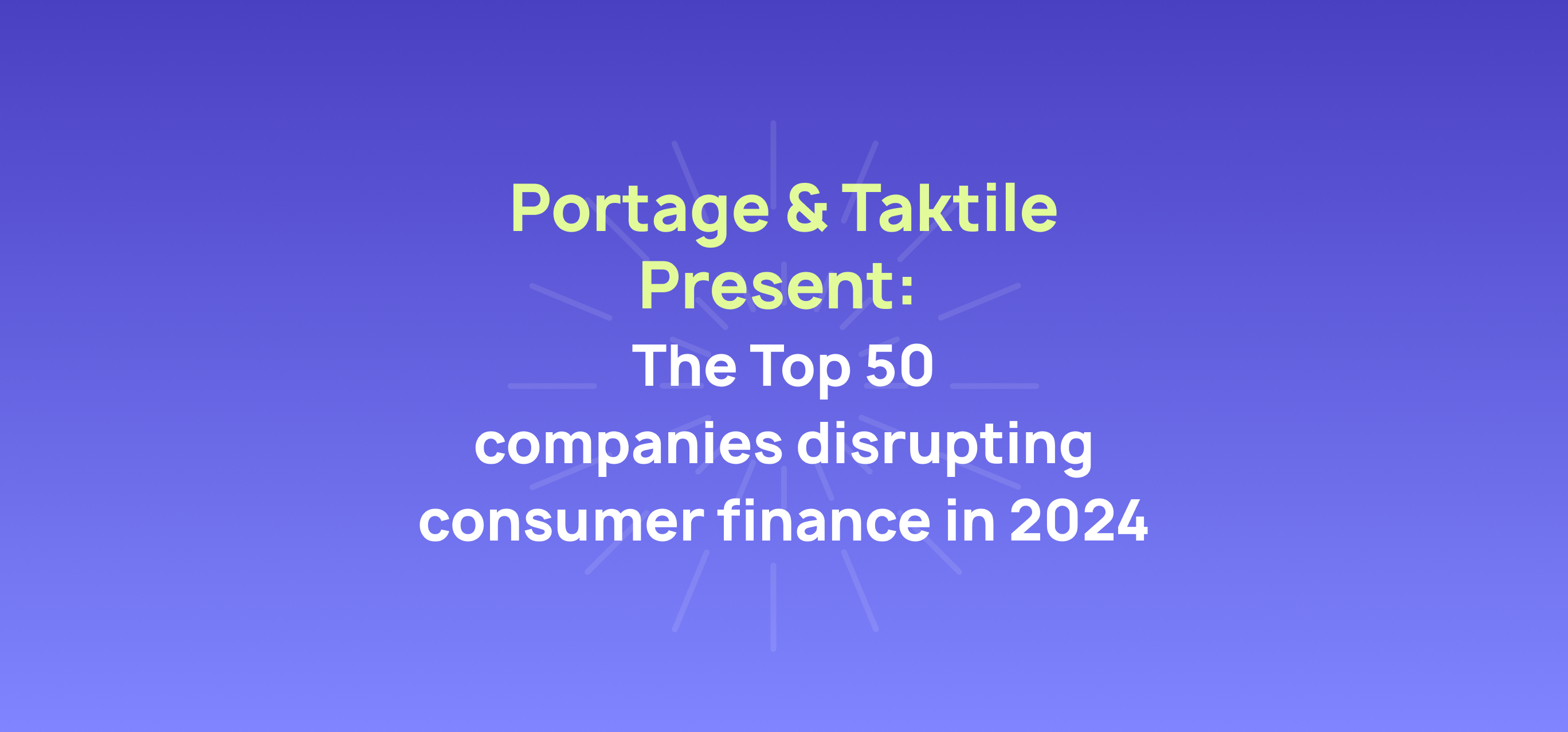B2C, Fintech, Lending 5 min read
Taktile & Portage Present: The Top 50 disruptors in US consumer finance

The consumer finance industry is undergoing a significant transformation, with 2024 heralding a new era of financial inclusion and consumer empowerment.
This year, the demand for hyper-personalized and convenient financial products in the US has surged. In response, innovative startups and established fintech leaders are making existing products more fair and accessible while accelerating product development to serve those traditionally underserved or marginalized by traditional establishments.
In collaboration with Portage, a global investment platform, Taktile is proud to present the Top 50 US fintech companies disrupting the status quo of consumer finance in 2024.
“We’re excited about companies using technology to expand access to credit in traditionally underserved markets by creating brand new categories of products. From new credit-building products to asset-backed credit products to companies enabling and using income-based underwriting models. We’re looking forward to seeing the next generation of companies which we believe will be able to combine sophisticated hyper-targeted data models with a frictionless customer experience.” explains Portage Partner Stephanie Choo.

Pay later offerings continue to gain traction
Buy Now, Pay Later (BNPL) offerings have significantly penetrated the US market, appealing to consumers of all ages.
This exceptional growth has been driven by the simplicity and easily embeddable nature of products from companies like Zilch, Splitit, and Snap Finance. These companies have showcased the impact of modern product design, utilizing alternative data points and channels to create smooth and frictionless buyer journeys for consumers.
In 2024, we are also seeing this trend expand beyond goods and services into adjacent offerings like "Transfer Now, Pay Later." Fintech companies like Pomelo are at the forefront of this shift, enabling consumers to use credit for international money transfers with zero transfer fees.
Personal loans get genuinely personal
Removing friction from the customer journey, regardless of the path they may be on, is a prominent theme across every category this year. This trend is particularly evident, however, in the personal loan sector, where the growing sophistication of internal and external data sources is enabling lenders to create hyper-personalized loan products for otherwise marginalized consumers.
For instance, Chime has introduced SpotMe, a fee-free overdraft product that can be boosted by friends and family and seamlessly integrates with its credit builder product. SoFi now offers loan products tailored to specific needs such as IVF treatments, weddings, home improvements, and vacations.
Additionally, Seis provides a banking platform entirely in Spanish for Spanish speakers who have immigrated to the US, ensuring fair and accessible finance options.
In the realm of education, Climb Credit stands out as an innovative student payment platform. It identifies programs and schools that enhance graduates' earnings and offers tailored financing options to meet individual needs.
Personal finance has a makeover for the next generation
Fintech companies are also advancing the development of comprehensive personal finance management tools.
This year, an increasing number of sophisticated apps are emerging, offering integrated features for loans, budgeting, saving, and investing. These innovations are particularly impactful for consumer segments that lack sophisticated financial expertise and, therefore, benefit from more guided and educational solutions.
Take Crew, for example. It has created a dedicated family banking app that simplifies financial management for parents and helps them teach children essential money skills. And M1 has designed a market-leading UI that unlocks sophisticated wealth-building opportunities for the everyday consumer.
Credit building apps unlock financial empowerment
As consumers seek greater transparency and control over their finances, a wave of impressive credit-building products has also emerged.
These advancements are clearly reshaping the credit landscape as they empower individuals to take control of their future access to credit like never before.
Fintech companies are at the forefront of this transformation, developing innovative solutions that promote responsible financial behavior while integrating educational and financial management tools.
For instance, Seen created the Seen Mastercard®, an invitation-only credit card that can be linked to its mobile app which is specifically designed for people looking to build or rebuild their credit.
Adding to the landscape, Super.com has created an all-in-one app featuring the interest-free Super™ Card, enabling users to build credit and monitor their credit scores directly from the app. Meanwhile, Altro has introduced a credit builder credit card that leverages subscription payments for services like Netflix and Hulu to help customers enhance their credit scores.
Credit cards regain the spotlight
Unlike previous years, where the best rewards programs often drove the most popularity, we believe the credit card industry is now thriving through hyper-personalization and accessibility. This shift is primarily driven by innovative use of alternative data and advanced risk assessment techniques, making credit more inclusive for US consumers.
For example, Zolve addresses the challenges faced by immigrants moving to the US, offering three card options without requiring a Social Security number to help newcomers establish credit.
Avant, a rapidly growing leader, facilitates quick credit card applications and proactively increases credit lines to support credit building. And Aven has created a credit card that lets consumers leverage their home equity to get really low rates.
Future outlook
As the demand for consumer credit continues to evolve, fintech companies have endless opportunities to develop unique products that effectively address their customers’ needs.
Looking ahead, we believe the key to significantly more accurate risk assessments—and consequently, the creation of new financial products—lies in accessing real-time, alternative data sources. This is particularly crucial for consumers who don’t meet the traditional credit scoring criteria of banks and larger financial institutions.
We anticipate the growing adoption and accelerated use of unique data sources such as open banking and marketplace data.
A notable trend is the “plug and play” approach to new and alternative data sources. Enabled by next-generation decision platforms like Taktile, this capability allows teams to rapidly experiment and iteratively test how they can best onboard and underwrite both existing and future customer segments using new data sources.
As this new chapter gains momentum, we look forward to witnessing how fintechs will evolve their infrastructure and capabilities to offer consumers the best possible products on the market.
About Portage
Portage is a global investment platform focused on FinTech and Financial Services with over US $2.5 Billion in assets under management.
Portage's team partners with ambitious companies across all stages through Portage Ventures and Portage Capital Solutions. It provides flexible capital and delivers a global network of investors, commercial partners, advisors, and value creation experts. With deep industry knowledge and entrepreneurial experience, Portage is committed to supporting the leaders who are reshaping financial services. Portage operates in the United States, Canada, and Europe. Portage is a platform within Sagard, a global multi-strategy alternative asset management firm with over $25B under management. For more information, visit www.portageinvest.com.






